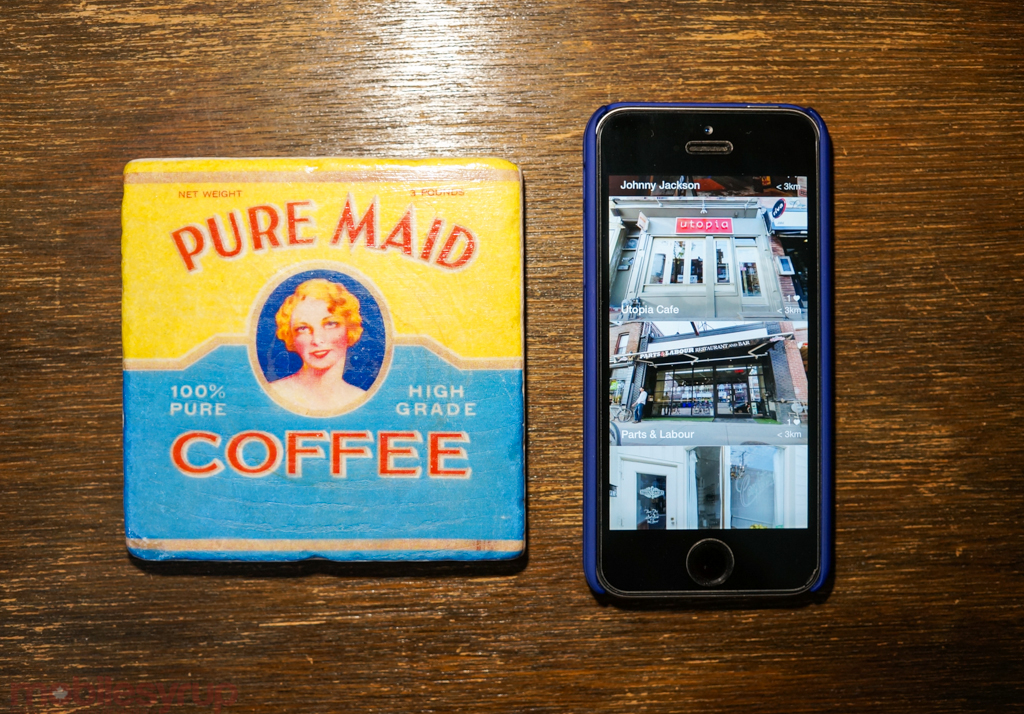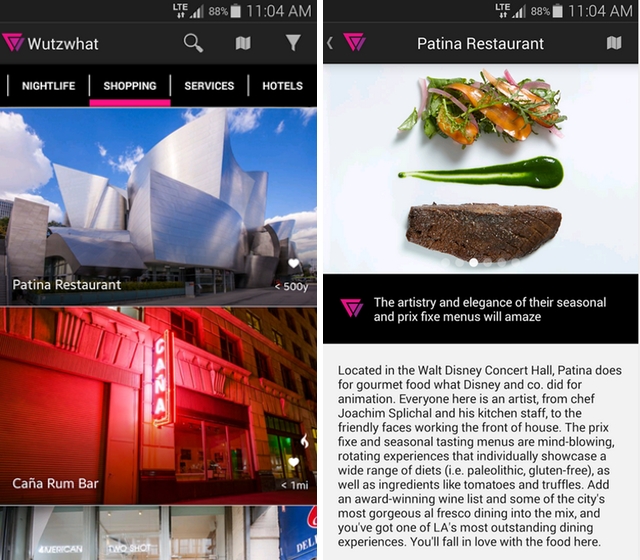
When the 23 year-old co-founder of a startup with fewer than 1,000 users talks, with confidence, of his company going public, you can’t fault him for lack of ambition. And Aaron Tench is certainly ambitious.
His company, Wutzwhat, is taking on the big names in local discovery, companies like Foursquare, Yelp, Facebook and Google that have amassed billions of data points and hundreds of millions of users. But Tench is not phased by the Herculean task’s scale, as he and his team of engineers, designers and editorialists are focusing on one avenue of differentiation: curation.
Available for iOS and Android, users open Wutzwhat and immediately see a visual scrolling list of attractions — restaurants, nightclubs, shops, hotels, service providers — all of which have been painstakingly plucked from thousands of potential choices. Think of the app as a Top Ten list of the places in your area.
The team has worked for two years to get here. Tench, who came from and was quickly burned out by the world of underwriting, has a co-founder and CEO in Emery Bishop, the man behind mobile dev house knight bishop + queen, and together decided to scrap and restart the app at least twice. After outsourcing the app’s development to India with disastrous results, Tench and Bishop went all-in on a local front- and backend powerhouse, and are now up to 17 full-time employees. They’re also investing heavily in content management for the merchants and vendors they work with, creating an HTML5-based web portal that can be accessed from mobile or the web.
While Wutzwhat purports to do things differently than their competitors, at the moment the company is hampered by lack of content; available only in three cities, Toronto, New York and Los Angeles, they are building up an enormous database of high-quality merchants to readily entice willing tourists, visitors and locals. And it works: opening up the app in my Toronto neighbourhood, I noticed at the top of the Wutzwhat page — the first and most important screen a new user will see — some little-known holes in the wall that I frequent but are featured neither on Yelp or Foursquare. Of course, that may change, but at the moment it appears that the startup has a good handle on what’s trending in the cities they do cover.
The company has raised $1.6 million locally, and is looking to raise more in the coming months. While it may be difficult to convince investors that Wutzwhat is more than just another Yelp or Foursquare clone, both of which have spent years building up databases of customer preferences, reviews and analytics, Tench says he’s not competing with those guys: “We’re your friend who knows all the good places in the city,” he tells me. “We tell people we’re your personal concierge,” a one-stop app to open when touching down in a new city or town. New investment will go towards expanding the geographic reach of the company, as well as fleshing out the merchant portal, which offers both basic and premium tiers.
While the app will likely stay free for users indefinitely, Wutzwhat derives revenue by collecting commission from merchant perks. The merchants themselves are run through the proverbial ringer before being chosen to be featured in the app (with no money changing hands, according to Tench), all of whom have access to customer analytics. “We’re trying to add value,” he says, “so they can pay to see who’s loving them, favouriting them, and redeeming their perks.” A premium service tier, with additional analytics information, is available to merchants for a monthly fee.
Coming later this summer, perks are another way Tench and his team plan to disrupt the local discovery ecosystem. While both Foursquare and Yelp, among others, offer check-in based rewards for loyal customers, Wutzwhat takes that a step further by adding a commerce element. The company has worked with its restaurant, hotel, entertainment and shopping partners to create a series of bespoke offers that customers can pay for, and redeem, in the app.
Unlike unlocking a free side of fries with the purchase of a burger, as one would likely do on Foursquare, Wutzwhat’s perks are larger, more exclusive, and almost always cost money. While the target client may be similar, Tench and his team are clearly going after a more elite, high-income group here, the kind that is likely to $100 upfront for a dinner for two at a local gem if it means getting a dessert not available on the regular menu. It’s these experiences, among the high quality curated editorial content, that Tench hopes will catalyze customer retention, and put Wutzwhat on the main screen of every iPhone and Android device in Toronto, New York and LA.

It was important, too, for the company to launch a native Android app at the same time as its iPhone counterpart. After dealing with the disappointment of having to reengineer the app from scratch, Tench learned that making the investment in dedicated Android and iOS front and backend developers is, and will continue to be, a key to success going forward. The app loads quickly and scrolls smoothly, even on aging Android hardware, and there’s care taken to make the app feel native on Google’s platform, something that Yelp’s app still lacks.
When a user signs up for an account in order to save merchants for later perusal, the app caches that content for later, ensuring that the restaurant’s address and map info is still available without an internet connection. The company has also teamed with Hailo’s API to instantly hail a cab to the bar or restaurant you selected, and first-time users get a $20 Black Car credit. Little touches like that, including a simple but capable search and filtering feature, differentiate it, too, from a sea of competitors.
Wutzwhat has a long road ahead, but is now looking to ramp up user acquisition to prove to merchants that the business model is viable. There’s an analog process to the whole thing, too, in that the company will provide stickers of approval for the entrances of merchants it works with. Down the road, the company’s editorial team will release a series of videos with influencers from its supported cities to further traffic to the app.
These are the burdens, the aching day-to-day slogs, of building a startup today in a world beset with an abundance of choice. As a young entrepreneur with no shortage of confidence, and a modicum of self-admitted arrogance, Tench is clearly no quitter, but the harsh realities of a mature app ecosystem may have more to say than any beautifully-described plate of sushi.
MobileSyrup may earn a commission from purchases made via our links, which helps fund the journalism we provide free on our website. These links do not influence our editorial content. Support us here.


